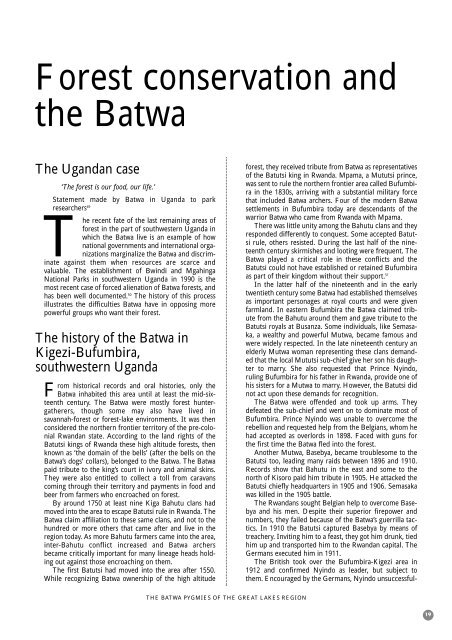The Batwa Pygmies of the Great Lakes Region - UNHCR
The Batwa Pygmies of the Great Lakes Region - UNHCR
The Batwa Pygmies of the Great Lakes Region - UNHCR
You also want an ePaper? Increase the reach of your titles
YUMPU automatically turns print PDFs into web optimized ePapers that Google loves.
Forest conservation and<br />
<strong>the</strong> <strong>Batwa</strong><br />
<strong>The</strong> Ugandan case<br />
‘<strong>The</strong> forest is our food, our life.’<br />
Statement made by <strong>Batwa</strong> in Uganda to park<br />
researchers49 <strong>The</strong> recent fate <strong>of</strong> <strong>the</strong> last remaining areas <strong>of</strong><br />
forest in <strong>the</strong> part <strong>of</strong> southwestern Uganda in<br />
which <strong>the</strong> <strong>Batwa</strong> live is an example <strong>of</strong> how<br />
national governments and international organizations<br />
marginalize <strong>the</strong> <strong>Batwa</strong> and discriminate<br />
against <strong>the</strong>m when resources are scarce and<br />
valuable. <strong>The</strong> establishment <strong>of</strong> Bwindi and Mgahinga<br />
National Parks in southwestern Uganda in 1990 is <strong>the</strong><br />
most recent case <strong>of</strong> forced alienation <strong>of</strong> <strong>Batwa</strong> forests, and<br />
has been well documented. 50 <strong>The</strong> history <strong>of</strong> this process<br />
illustrates <strong>the</strong> difficulties <strong>Batwa</strong> have in opposing more<br />
powerful groups who want <strong>the</strong>ir forest.<br />
<strong>The</strong> history <strong>of</strong> <strong>the</strong> <strong>Batwa</strong> in<br />
Kigezi-Bufumbira,<br />
southwestern Uganda<br />
From historical records and oral histories, only <strong>the</strong><br />
<strong>Batwa</strong> inhabited this area until at least <strong>the</strong> mid-sixteenth<br />
century. <strong>The</strong> <strong>Batwa</strong> were mostly forest hunterga<strong>the</strong>rers,<br />
though some may also have lived in<br />
savannah-forest or forest-lake environments. It was <strong>the</strong>n<br />
considered <strong>the</strong> nor<strong>the</strong>rn frontier territory <strong>of</strong> <strong>the</strong> pre-colonial<br />
Rwandan state. According to <strong>the</strong> land rights <strong>of</strong> <strong>the</strong><br />
Batutsi kings <strong>of</strong> Rwanda <strong>the</strong>se high altitude forests, <strong>the</strong>n<br />
known as ‘<strong>the</strong> domain <strong>of</strong> <strong>the</strong> bells’ (after <strong>the</strong> bells on <strong>the</strong><br />
<strong>Batwa</strong>’s dogs’ collars), belonged to <strong>the</strong> <strong>Batwa</strong>. <strong>The</strong> <strong>Batwa</strong><br />
paid tribute to <strong>the</strong> king’s court in ivory and animal skins.<br />
<strong>The</strong>y were also entitled to collect a toll from caravans<br />
coming through <strong>the</strong>ir territory and payments in food and<br />
beer from farmers who encroached on forest.<br />
By around 1750 at least nine Kiga Bahutu clans had<br />
moved into <strong>the</strong> area to escape Batutsi rule in Rwanda. <strong>The</strong><br />
<strong>Batwa</strong> claim affiliation to <strong>the</strong>se same clans, and not to <strong>the</strong><br />
hundred or more o<strong>the</strong>rs that came after and live in <strong>the</strong><br />
region today. As more Bahutu farmers came into <strong>the</strong> area,<br />
inter-Bahutu conflict increased and <strong>Batwa</strong> archers<br />
became critically important for many lineage heads holding<br />
out against those encroaching on <strong>the</strong>m.<br />
<strong>The</strong> first Batutsi had moved into <strong>the</strong> area after 1550.<br />
While recognizing <strong>Batwa</strong> ownership <strong>of</strong> <strong>the</strong> high altitude<br />
THE BATWA PYGMIES OF THE GREAT LAKES REGION<br />
forest, <strong>the</strong>y received tribute from <strong>Batwa</strong> as representatives<br />
<strong>of</strong> <strong>the</strong> Batutsi king in Rwanda. Mpama, a Mututsi prince,<br />
was sent to rule <strong>the</strong> nor<strong>the</strong>rn frontier area called Bufumbira<br />
in <strong>the</strong> 1830s, arriving with a substantial military force<br />
that included <strong>Batwa</strong> archers. Four <strong>of</strong> <strong>the</strong> modern <strong>Batwa</strong><br />
settlements in Bufumbira today are descendants <strong>of</strong> <strong>the</strong><br />
warrior <strong>Batwa</strong> who came from Rwanda with Mpama.<br />
<strong>The</strong>re was little unity among <strong>the</strong> Bahutu clans and <strong>the</strong>y<br />
responded differently to conquest. Some accepted Batutsi<br />
rule, o<strong>the</strong>rs resisted. During <strong>the</strong> last half <strong>of</strong> <strong>the</strong> nineteenth<br />
century skirmishes and looting were frequent. <strong>The</strong><br />
<strong>Batwa</strong> played a critical role in <strong>the</strong>se conflicts and <strong>the</strong><br />
Batutsi could not have established or retained Bufumbira<br />
as part <strong>of</strong> <strong>the</strong>ir kingdom without <strong>the</strong>ir support. 51<br />
In <strong>the</strong> latter half <strong>of</strong> <strong>the</strong> nineteenth and in <strong>the</strong> early<br />
twentieth century some <strong>Batwa</strong> had established <strong>the</strong>mselves<br />
as important personages at royal courts and were given<br />
farmland. In eastern Bufumbira <strong>the</strong> <strong>Batwa</strong> claimed tribute<br />
from <strong>the</strong> Bahutu around <strong>the</strong>m and gave tribute to <strong>the</strong><br />
Batutsi royals at Busanza. Some individuals, like Semasaka,<br />
a wealthy and powerful Mutwa, became famous and<br />
were widely respected. In <strong>the</strong> late nineteenth century an<br />
elderly Mutwa woman representing <strong>the</strong>se clans demanded<br />
that <strong>the</strong> local Mututsi sub-chief give her son his daughter<br />
to marry. She also requested that Prince Nyindo,<br />
ruling Bufumbira for his fa<strong>the</strong>r in Rwanda, provide one <strong>of</strong><br />
his sisters for a Mutwa to marry. However, <strong>the</strong> Batutsi did<br />
not act upon <strong>the</strong>se demands for recognition.<br />
<strong>The</strong> <strong>Batwa</strong> were <strong>of</strong>fended and took up arms. <strong>The</strong>y<br />
defeated <strong>the</strong> sub-chief and went on to dominate most <strong>of</strong><br />
Bufumbira. Prince Nyindo was unable to overcome <strong>the</strong><br />
rebellion and requested help from <strong>the</strong> Belgians, whom he<br />
had accepted as overlords in 1898. Faced with guns for<br />
<strong>the</strong> first time <strong>the</strong> <strong>Batwa</strong> fled into <strong>the</strong> forest.<br />
Ano<strong>the</strong>r Mutwa, Basebya, became troublesome to <strong>the</strong><br />
Batutsi too, leading many raids between 1896 and 1910.<br />
Records show that Bahutu in <strong>the</strong> east and some to <strong>the</strong><br />
north <strong>of</strong> Kisoro paid him tribute in 1905. He attacked <strong>the</strong><br />
Batutsi chiefly headquarters in 1905 and 1906. Semasaka<br />
was killed in <strong>the</strong> 1905 battle.<br />
<strong>The</strong> Rwandans sought Belgian help to overcome Basebya<br />
and his men. Despite <strong>the</strong>ir superior firepower and<br />
numbers, <strong>the</strong>y failed because <strong>of</strong> <strong>the</strong> <strong>Batwa</strong>’s guerrilla tactics.<br />
In 1910 <strong>the</strong> Batutsi captured Basebya by means <strong>of</strong><br />
treachery. Inviting him to a feast, <strong>the</strong>y got him drunk, tied<br />
him up and transported him to <strong>the</strong> Rwandan capital. <strong>The</strong><br />
Germans executed him in 1911.<br />
<strong>The</strong> British took over <strong>the</strong> Bufumbira-Kigezi area in<br />
1912 and confirmed Nyindo as leader, but subject to<br />
<strong>the</strong>m. Encouraged by <strong>the</strong> Germans, Nyindo unsuccessful-<br />
19

















